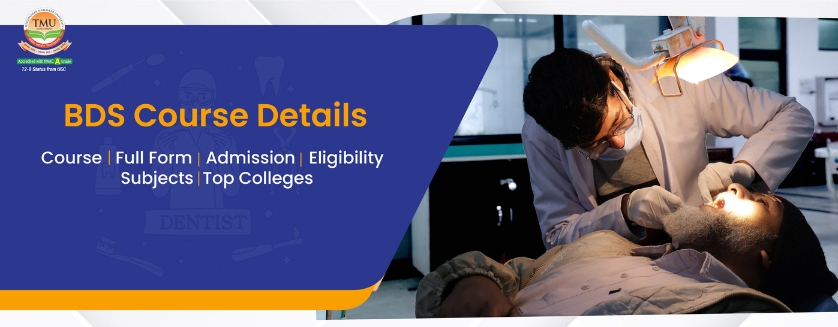BDS Course Details, Full Form, Duration, Eligibility, Colleges and Career
Table of Contents
BDS full form is Bachelor of Dental Surgery, an undergraduate degree program that trains students to become skilled dental professionals. Through this course, students learn to diagnose, prevent, and treat oral diseases, making it one of the most sought-after professional programmes in the field of healthcare.
The BDS course duration is typically 5 years, comprising 4 years of academic study focused on dentistry subjects and 1 year of mandatory rotating internship for hands-on clinical training. This structure ensures that graduates are well-prepared with both theoretical knowledge and practical expertise.
To pursue a BDS, students generally need to complete their 10+2 (higher secondary education) with Physics, Chemistry, and Biology, achieving around 45–50% marks depending on the institution. In many countries, qualifying entrance exams are also required for admission.
With its blend of classroom learning and practical exposure, the BDS programme opens pathways to rewarding careers in dentistry, oral healthcare, and research.
The BDS curriculum encompasses a wide range of dental sciences. You'll learn about oral anatomy, dental materials, and general dentistry procedures. Additionally, it covers periodontology (gum disease), orthodontics (teeth alignment), and prosthodontics (replacing missing teeth). It also consists of courses in oral pathology, endodontics (treating dental pulp), and oral surgery. The BDS program often combines classroom lectures with practical sessions in dental labs and clinical rotations in dental clinics to reinforce your learning.
BDS Full Form
BDS stands for Bachelor of Dental Surgery. The term "Bachelor of Dental Surgery" is used because the degree focuses on the field of dental science, specifically on the surgical aspects of dentistry.
Teerthanker Mahaveer University
Apply for Admission
Click Here To Apply for Admission
BDS Course Details
Bachelor of Dental Surgery(BDS) is a 5-year undergraduate program, including 4 years of academic study and 1 year of internship. Eligibility requires 12th-grade completion with Physics, Chemistry, and Biology, and passing an entrance exam like NEET. The curriculum covers human anatomy, physiology, pathology, dental materials, and clinical dentistry. The internship provides practical experience in various dental specialities. Graduates can become dental practitioners, surgeons, or specialists in orthodontics, periodontics, and more.
BDS Duration
The Bachelor of Dental Surgery (BDS) program has a duration of 5 years. This includes:
- 4 years of academic coursework covering theoretical and practical aspects of dental science.
- 1 yearof mandatory rotating internship to gain hands-on clinical experience across various dental departments.
BDS Syllabus and Curriculum
The BDS (Bachelor of Dental Surgery) curriculum is comprehensive and covers a wide range of dental sciences over five years of full-time study. Here's a breakdown of the general structure and some key subject areas:
| Section | Description |
| Structure | Classroom lectures, Laboratory sessions, Clinical rotations under supervision |
| Subject Areas |
|
Eligibility Criteria for BDS in India: Beyond Minimum Marks
Eligibility for BDS is designed to ensure that candidates possess the scientific aptitude and clinical readiness required for dental education. Applicants must have completed 10+2 with Physics, Chemistry, and Biology as core subjects from a recognised board, meeting the minimum qualifying percentage prescribed by regulatory authorities.
More importantly, qualifying for NEET-UG is mandatory for BDS admission across India. NEET serves as a standardised assessment to evaluate a student’s understanding of life sciences, problem-solving ability, and readiness for professional medical education. Admission is strictly merit-based through central or state-level counselling, ensuring transparency and academic fairness.
This eligibility framework ensures that only candidates with both academic foundation and competitive competence enter the dental profession.
Entrance Exams for BDS
To gain admission into a Bachelor of Dental Surgery (BDS) program, candidates are required to appear for entrance exams. The primary entrance exams for BDS include:
| Entrance Exam | Description |
| National Eligibility cum Entrance Test (NEET) | National-level exam conducted by NTA for admission to medical and dental courses in India |
| AIIMS Entrance Exam | The entrance exam is conducted by AIIMS for admission to its BDS program. |
| State-Level Entrance Exams | Various states conduct their own entrance exams for BDS admission in state-affiliated colleges. |
| University-Level Entrance Exams | Some universities conduct their own entrance exams for admission to BDS programs in their colleges. |
BDS Admission Process
The admission process for Bachelor of Dental Surgery (BDS) programs typically involves the following steps:
- Appear for the Entrance Exam:
- Candidates must appear for entrance exams like NEET (National Eligibility cum Entrance Test) conducted at the national level or state-level entrance exams specific to certain states.
- Check Eligibility:
- To be eligible for BDS admission, candidates must meet the educational requirements and pass the entrance exam with a minimum score.
- Apply for Counselling:
- After the entrance exam results are announced, eligible candidates need to register for counselling conducted by the respective authorities.
- Choice Filling:
- During counselling, candidates are required to fill in their preferences for dental colleges and courses based on their rank in the entrance exam.
- Document Verification:
- Candidates must undergo document verification to confirm their eligibility for admission. Required documents may include mark sheets, certificates, identity proof, and others.
- Seat Allotment:
- Based on the candidate's rank in the entrance exam and their choices filled during counselling, seats are allotted in dental colleges.
- Reporting to Allotted College:
- Once seats are allotted, candidates need to report to the allotted dental college within the specified time frame to complete the admission formalities.
- Payment of Fees:
- Candidates need to pay the prescribed fees for admission, which may include tuition fees, caution deposits, and other charges.
- Commencement of Classes:
- After completing the admission process and payment of fees, candidates can attend classes as per the schedule of the dental college.
It's essential for candidates to stay updated with notifications from counselling authorities and follow the prescribed procedures to ensure a smooth admission process into BDS programs.
Top Dental Colleges
Several institutions in India offering BDS programmes have been evaluated by the Indian Institutional Ranking Framework (IIRF) for their academic standards, clinical infrastructure, faculty strength, and hospital integration. Some of these institutions include:
| College | Location |
| Maulana Azad Institute of Dental Sciences (MAIDS) | Delhi |
| Manipal College of Dental Sciences (MCODS) | Manipal |
| Government Dental College & Hospital (GDCH) | Mumbai |
| Sri Ramachandra Institute of Higher Education and Research | Chennai |
| Christian Dental College | Ludhiana |
| Teerthanker Mahaveer University(TMU) | Moradabad |
Why Choose TMU for BDS?
Choosing Teerthanker Mahaveer Dental College & Research Centre (TMDCRC) for BDS offers several compelling reasons:
- Quality Education: TMDCRC is known for providing high-quality dental education with a comprehensive curriculum and state-of-the-art facilities.
- Experienced Faculty: The college boasts experienced and skilled faculty members dedicated to imparting students knowledge and skills.
- Clinical Exposure: TMDCRC offers ample clinical exposure, providing students with opportunities to gain hands-on experience in treating patients under the guidance of experienced professionals.
- Research Opportunities: The college encourages research activities, allowing students to explore their interests and contribute to the field of dentistry through research projects and publications.
- Reputation: Teerthanker Mahaveer University (TMU), of which TMDCRC is a part, has a reputable name in the field of education, further enhancing the credibility of the dental college.
BDS Fees
The fees for BDS (Bachelor of Dental Surgery) programs vary depending on the college, location, and facilities provided.
| Type of College | Average Annual Fees (INR) |
| Private Dental College | ₹2,00,000 - ₹5,00,000 |
| Government Dental College | ₹50,000 - ₹2,00,000 |
It's essential to check with specific colleges for the most accurate and up-to-date information on fees and additional expenses such as hostel fees, examination fees, and other miscellaneous charges.
BDS vs MBBS vs BHMS
| Aspect | BDS (Bachelor of Dental Surgery) | MBBS (Bachelor of Medicine, Bachelor of Surgery) | BHMS (Bachelor of Homeopathic Medicine and Surgery) |
| Specialisation | Dentistry | Allopathic Medicine | Homeopathic Medicine and Surgery |
| Duration | 5 years (4 years of academic study + 1 year internship) | 5.5 years (4.5 years of academic study + 1 year internship) | 5.5 years (4.5 years of academic study + 1 year internship) |
| Focus | Focuses on diagnosing, treating, and preventing oral diseases and conditions. | Focuses on diagnosing, treating, and preventing diseases using allopathic medicine | Focuses on diagnosing, treating, and preventing diseases using homoeopathic principles. |
| Career Path | Can become a dentist, dental surgeon, orthodontist, periodontist, etc. | Can become a doctor, general physician, surgeon, specialist, etc. | Can become a homoeopathic doctor, practitioner, consultant, etc |
| Licensing | Requires registration with dental councils (e.g., Dental Council of India) | Requires registration with medical councils (e.g., Medical Council of India) | Requires registration with homeopathy councils (e.g., Central Council of Homeopathy) |
| Treatment | Treats dental and oral health issues such as tooth decay, gum diseases, and oral infections. | Treats various medical conditions, injuries, and illnesses using pharmaceuticals, surgery, etc. | Treats illnesses using diluted substances that produce similar symptoms in healthy individuals. |
| Approach | Focuses on oral health and dental treatments | Diagnosis and treatment of a wide range of medical conditions | Focuses on holistic healing and individualised treatment based on the principles of homoeopathy |
BDS Scope, Salary & Opportunities
Scope:
- BDS graduates have a wide scope of opportunities in both public and private sectors.
- They can work as dental practitioners, dental surgeons, orthodontists, periodontists, oral pathologists, dental educators, or researchers.
- With further specialisations and experience, they can also pursue careers in academics, dental public health, dental administration, and dental consultancy.
Salary:
- The salary for BDS graduates varies depending on factors such as location, type of practice, experience, and specialisation.
- In India, fresh BDS graduates can expect an average starting salary ranging from ₹20,000 to ₹40,000 per month in private clinics or dental hospitals.
- With experience and specialisation, BDS professionals can earn significantly higher salaries, ranging from ₹50,000 to ₹1,00,000 per month or more.
Opportunities:
- Private Practice: Many BDS graduates choose to set up their own dental clinics or join established private practices.
- Government Jobs: BDS professionals can work in government hospitals, dental colleges, public health departments, and defence services.
- Corporate Sector: Dental professionals are also in demand in corporate healthcare setups, insurance companies, pharmaceutical companies, and dental product manufacturing firms.
- Academics & Research: BDS graduates can pursue teaching and research opportunities in dental colleges and universities.
- International Opportunities: There are opportunities for BDS professionals to work abroad in countries with a shortage of dental practitioners.
BDS Internships
Internships are an integral part of the BDS (Bachelor of Dental Surgery) program, providing students with practical exposure and hands-on experience in various aspects of dentistry. Here's an overview of BDS internships:
Level Up Your Dental Skills with BDS Internships (Optional)!
- Not required, but awesome! Get hands-on experience before you start practising.
- Do cool stuff! Assist dentists, learn new skills, and see different areas of dentistry.
- Examples: Fill cavities (with supervision!), clean teeth, make x-rays, work with kids (paediatrics).
- Stand out from the crowd! Boost your resume for jobs or further studies.
Find Your Perfect Internship:
- Talk to your college. They might have connections with hospitals or clinics.
- Call local dentists. Ask if they offer internship opportunities.
- Search online. Look for BDS internships on job websites or dental association pages.
BDS internships provide students with valuable clinical experience, preparing them for the challenges of professional dental practice and laying the foundation for their future careers as dental professionals.
What After BDS?
After completing BDS (Bachelor of Dental Surgery), there are various career pathways and options available for graduates to pursue. Here are some common options:
Be a Dentist!
- Private Practice: Your clinic, be your boss!
- Work in a Hospital: Treat patients in a hospital setting.
- Government Job: Stable career with good benefits.
Keep Learning!
- Become a Specialist: Earn an MDS degree to focus on a specific area like braces (orthodontics) or surgery.
- Take Extra Courses: Learn about running a dental practice or public health.
Other Paths:
- Do Research: Help develop new dental treatments.
- Solve Crimes: Use your dental skills to help with investigations.
Teach Dentistry: Train the next generation of dentists!
MDS
MDS (Master of Dental Surgery)is a postgraduate program that provides advanced training and specialisation in various branches of dentistry. Here's an overview:
Duration:
- MDS programs typically have a duration of 3 years.
Specialisations:
- MDS offers specialisations in various branches of dentistry, including:
- Oral and Maxillofacial Surgery
- Orthodontics
- Periodontics
- Prosthodontics
- Conservative Dentistry and Endodontics
- Oral Pathology
- Public Health Dentistry
- Paedodontics and Preventive Dentistry
- Oral Medicine and Radiology
Curriculum:
- The curriculum includes advanced theoretical study, clinical training, research, and practical experience in the chosen specialisation.
Career Opportunities:
- MDS graduates can pursue careers as specialist dentists in hospitals, dental clinics, academic institutions, research organisations, and private practice.
- They may also work as consultants, educators, researchers, or administrators in the field of dentistry.
Salary:
- Salaries for MDS graduates vary depending on factors such as specialisation, location, experience, and type of practice.
- On average, MDS specialists can earn significantly higher salaries compared to BDS graduates due to their advanced training and expertise.
BDS Research Opportunities
While the primary focus of BDS programs is clinical training, many universities offer research opportunities for students interested in contributing to the field of dentistry. Here's how you can explore research as a BDS student:
- Faculty Research Projects: Many professors at your dental college might be leading research projects in areas like oral health materials, dental implants, or oral diseases.
- Student Research Fellowships: Some dental colleges offer fellowships or grants specifically for students to pursue their research interests under faculty guidance.
- National & International Research Collaborations: Universities may collaborate with research institutions or dental associations on broader research projects.
Benefits of BDS Research:
- Gain Research Skills: Learn critical thinking, data analysis, and scientific writing – valuable skills for any career path.
- Contribute to Dentistry: Be part of advancements in oral care and treatments.
- Boost Your Profile: Research experience strengthens your resume for postgraduate studies or research careers.
Conclusion
In conclusion, the field of dentistry offers a wide range of opportunities for individuals pursuing a career in oral healthcare. The Bachelor of Dental Surgery (BDS) program equips students with the knowledge, skills, and practical experience necessary to become competent dental professionals. With a comprehensive curriculum covering various aspects of dental science and a mandatory internship providing hands-on clinical exposure, BDS graduates are well-prepared to embark on their professional journey.
Additionally, options such as specialisation through the Master of Dental Surgery (MDS) program, government or private sector employment, teaching and research opportunities, and international prospects further expand the horizons for BDS graduates. Whether it's providing direct patient care, conducting research, or contributing to public health initiatives, BDS graduates play a crucial role in promoting oral health and enhancing the quality of life for individuals worldwide.
FAQs
Q1: Is BDS a medical doctor?
Ans:No, BDS graduates are not medical doctors. They specialise in dentistry, focusing on oral health. While they can diagnose, prevent, and treat dental issues, they are not authorised to practice general medicine or perform medical procedures outside the scope of dentistry.
Q2: Is BDS equal to MBBS?
Ans:No, BDS (Bachelor of Dental Surgery) is not equal to MBBS (Bachelor of Medicine, Bachelor of Surgery). BDS focuses on dentistry, while MBBS focuses on general medicine and surgery. Both are separate undergraduate degrees in their respective fields of healthcare.
Q3: Is BDS possible without NEET?
Ans:In India, BDS (dentistry) almost always requires NEET (entrance exam). It ensures a baseline of knowledge and creates a fair system. Explore dental hygiene programs or other medical fields if NEET isn't an option. Research alternative paths to achieve your healthcare goals.
Q4: Can BDS do surgery?
Ans:In India, BDS (dentistry) almost always requires NEET (entrance exam). It ensures a baseline of knowledge and creates a fair system. Explore dental hygiene programs or other medical fields if NEET isn't an option. Research alternative paths to achieve your healthcare goals.
Q5: Is BDS tough or easy?
Ans:BDS demands hard work - intense studies, practice, and precision. It's not a breeze, but achievable with dedication and passion for dentistry. Compared to medicine (MBBS), the knowledge load might be less, but intricate dental procedures pose their own challenges.
This content gives an overview of the programme and is for educational purposes only. For updated admission guidelines and counselling support, please connect with our Counsellor Team.














